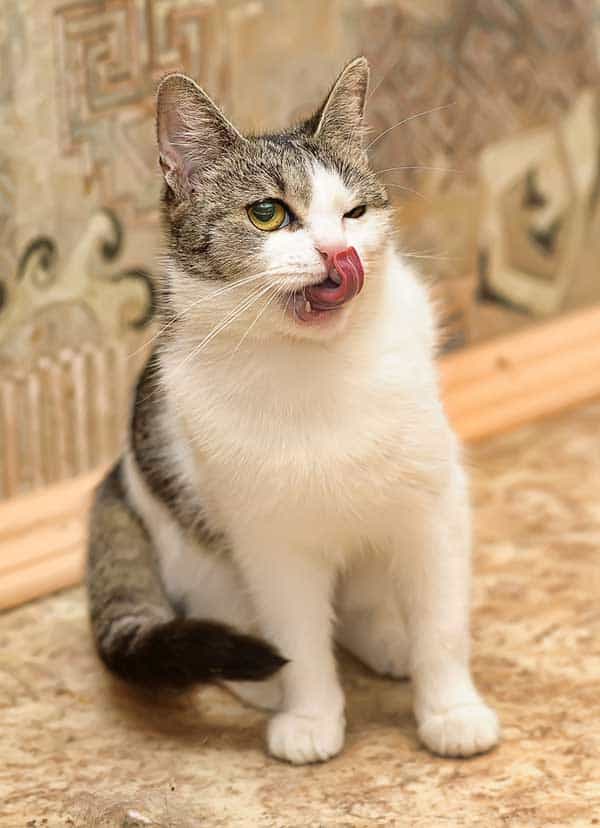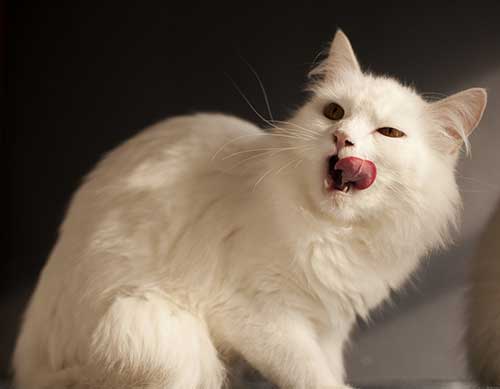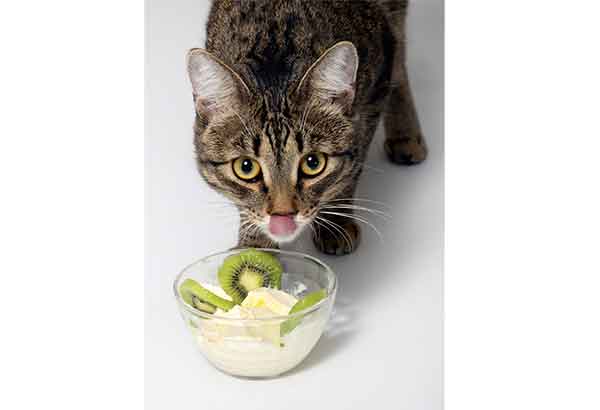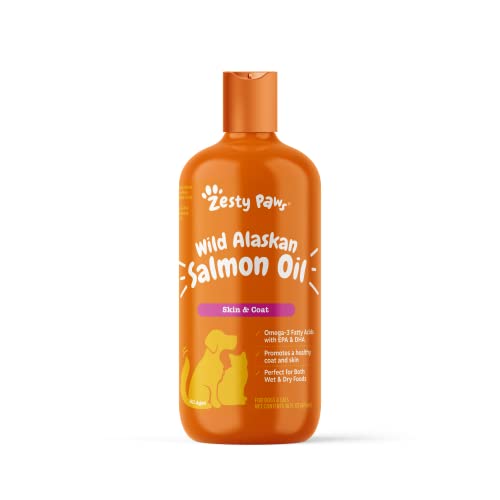Kiwi is popular for its flashy color, delectable taste, and a dense nutritional profile.
Many nutritionists and medical experts actually consider kiwi a superfood. As a superfood, the fruit supplies us with plenty of vitamins and essential minerals, while also helping to keep various medical conditions at bay.
But can the same be said about our feline friends? Can cats eat kiwi?
Generally, cats can eat kiwis. However, the answer is not as cut-and-dried as it may sound. While kiwis come with a cocktail of health and dietary benefits for your cat, the fruit also presents inherent dangers, such as its high sugar content.
So, is kiwi safe for cats?
The safety of kiwis for cats depends on how you feed them to your kitto. Once you’ve peeled the fruits, you can go ahead and offer them to your cat in moderation.
Table of Contents
Potential Health Benefits of Kiwis for Cats
Can cats have kiwi? As we’ve already indicated, cats can safely eat kiwis provided that you offer the fruits to your feline friend in moderation.
Now that cats can eat kiwis, you could be wondering how your kitto stands to benefit from these fruits both nutritionally and health-wise.
Typically, a serving size of 2 kiwis contains the following nutritional elements;
- Calories: 90
- Cholesterol: 0 mg
- Sodium: 0 mg
- Fat: 1 g
- Fiber: 4 g
- Sugars: 13 g
- Carbohydrate: 22 g
In addition to the above nutrients, kiwis are also loaded with minerals like calcium, iron, and potassium, as well as vitamins A and C.
The following are some of the potential health benefits of kiwis for cats;
1. Improved Digestion
Like most fruits, kiwis contain a significant amount of dietary fiber. When consumed, these fibers can aid your cat’s digestion by supplying the nutrients required by her gut-friendly bacteria.
Dietary fiber also improves digestion by bulking your cat’s stool, which is helpful in relieving various digestive complications like constipation and diarrhea.
Besides aiding your cat’s digestion, the fiber content in kiwis might also help with weight management.
As you may already know, fiber-rich foods are remarkable at creating a sense of fullness. Sprinkling small portions of kiwi on your cat’s regular food will cause the animal to eat less but feel fuller for longer.
By reducing her food portions and curbing her cravings, the dietary fiber in kiwi plays a crucial role in keeping your cat’s weight in check.
Remember that the fruit also contains low cholesterol and high water content, which all work in favor of weight management.
- PETKIT Automatic Cat Dog Feeder Dispenser for dog cat Pets
Last update on 2024-07-16 / Affiliate links / Images from Amazon Product Advertising API
2. Promotes a Healthy Coat
Kiwis also pack vitamin C, which is known for its ability to stimulate collagen production. By stimulating collagen synthesis, vitamin C might cause your cat’s coat to look firmer and more radiant.
3. Boosts Immunity
The high abundance of vitamin C in kiwis doesn’t just help with collagen production. The vitamin is also a renowned antioxidant. Vitamin C works synergistically with other antioxidants in the fruit, such as phenolics and carotenoids.
Together, the compounds prevent cell damage that results from oxidative stress caused by free radicals in your cat’s body. That way, they could help to keep chronic diseases like cancer and arthritis at bay, while also reducing the early signs of aging.
Will My Cat Enjoy Kiwi?
Cats are curious by nature and most of them would want to have a taste of kiwi at the slightest chance they can get. However, you can never tell whether your kitto will enjoy kiwi or not. She may either develop an instant liking for the fruit or become utterly averse to it.
Perhaps the real concern should be whether your cat will benefit from kiwi’s health and nutritional profile.
Cats are obligate carnivores, which means they can thrive almost exclusively on a diet of animal protein. As an obligate carnivore, your cat’s digestive system is more efficient at processing meat than plant-based foods.
Therefore, your kitto will certainly not benefit from kiwi the same way humans do. Worse yet, there are plenty of other things that could go wrong if you serve kiwi to your cat with careless abandon.

Possible Side Effects of Kiwis for Cats
The most obvious problem with kiwis for cats is the high sugar content in these fruits.
A serving of two kiwis comes with 13 grams of sugars and 22 grams of carbohydrates. That’s already way too high for most people. So, it defies logic that you’d want your kitto to consume so much sugar.
Sugar-rich foods are the primary risk factor for obesity and other debilitating conditions like diabetes and heart disease.
Worse yet, it’s important to note that the sweet taste buds in cats aren’t overly reactive. Which means that your feline friend can snack on too many kiwis without getting overwhelmed by the sugary taste of these fruits.
Besides increasing your cat’s susceptibility to obesity, diabetes, and heart disease, the high sugar content in kiwis might also cause tooth decay and other dental problems.
Another common drawback of offering kiwis to cats has everything to do with the fruits’ fiber content. Earlier on, we highlighted some of the proven health benefits of dietary fiber.
But since a cat’s digestive system isn’t designed primarily for processing plant-based foods, much of the fiber that cats consume in kiwis may go undigested. Too much fiber in your kitto’s stomach has a laxative effect, which could trigger diarrhea, leading to dehydration.
- Goes Great with Any Meal - For pet parents looking for an alternative to capsules, raw treats, or soft chews, all it takes is a...
- A tasty & body nourishing treat for cats & dogs - Essential fatty acids for a healthy coat.
- Powerful Omega Fatty Acids - This premium fish oil liquid formula is loaded with the healthy Omega-3 fatty acid (with EPA and DHA)...
Last update on 2024-07-16 / Affiliate links / Images from Amazon Product Advertising API
Lastly, it’s worth noting that like humans, cats can also develop kiwi allergy. Some cat owners have often wondered, can cats be allergic to kiwi?
Yes, cats can indeed suffer allergic reactions from eating kiwi? But how do I know if my cat is allergic to kiwi?
Some of the common signs of kiwi allergy include;
- Stomach upset,
- Diarrhea,
- Abdominal pain,
- Coughing,
- Sneezing,
- Runny eyes and nose,
- Dilated pupils, and
- Irritability
What Should I Do If My Cat Eats Kiwi?
There shouldn’t be any cause for alarm if your cat has only consumed small portions of kiwi. But if you suspect that the cat has gobbled down more kiwi than she should, monitor her condition over a couple of hours.
Watch out for any gastrointestinal complications like diarrhea or allergic reactions like coughing and sneezing.
Even if the cat doesn’t present any visible signs of illness, the conventional wisdom is to visit your vet. That’s particularly true if the cat has consumed high amounts of kiwi.

Conclusion
Cats can eat kiwis and there are no immediate health concerns to worry about. Just ensure that you peel the fruits before offering them to your kitto, as the skin can be a bit bitter and tough for the cat to chew. Most importantly, serve kiwis to your cat only in moderation.
Remember that at the end of the day, your feline friend is an obligate carnivore and should mostly consume meat.
Checkout Our Favorite Cat Products
1. Best Online Course For Cat Parents
Our favorite: The Cat Language Bible (How to Finally Undrestand And Speak to Your Cat) – A new form of cat to human communication that many cat owners have dreamed about… but few have actually thought possible.
2. Best Vacuum to Tackle Pet Hair
Our favorite: Dyson Ball Animal 2 – Engineered for homes with pets. With features and tools that dig out dirt, hair and allergens everywhere your pet gets.
3. Best Immune Support For Cats
Our favorite: Tomlyn Immune Support – Best Supplement for Cats and Kittens.





